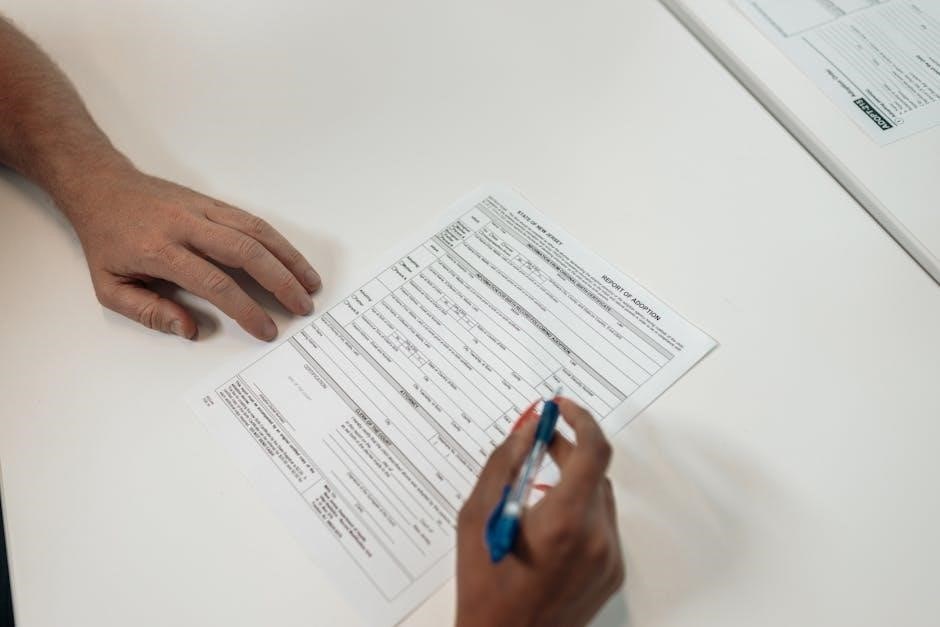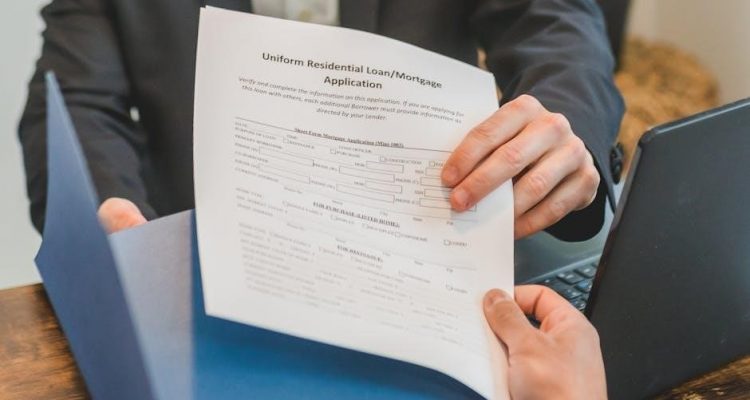The Texas Rental Application Form, provided by the Texas Association of Realtors, is an official document designed to help landlords assess potential tenants efficiently․
1․1 Overview of the Texas Rental Application Process
The Texas Rental Application Process involves submitting a standardized form, often the TAA-approved document, to provide landlord-required details․ Applicants must supply personal, financial, and rental history information․ A non-refundable fee typically covers screening costs․ The process ensures landlords can evaluate candidates fairly while complying with state laws․ Accurate and complete information is crucial for a smooth application․ This step-by-step approach helps both parties establish a clear understanding of expectations and requirements for tenancy․
1․2 Importance of Using the Official Texas Rental Application Form
Using the official Texas Rental Application Form ensures compliance with state laws and provides a standardized format for gathering essential applicant information․ It protects landlords by ensuring legal disclosures are included and helps maintain fair housing practices․ The form, often approved by the Texas Apartment Association (TAA), streamlines the screening process and reduces potential disputes․ Applicants benefit from clear expectations, while landlords gain a reliable tool for evaluating candidates consistently and professionally․
Key Elements of the Texas Rental Application Form
The Texas Rental Application Form includes sections for applicant details, property information, financial data, rental history, and legal disclosures, aiding landlords in evaluating potential tenants effectively․
2․1 Required Applicant Information
The Texas Rental Application Form requires applicants to provide personal details such as full name, date of birth, and Social Security number․ Additionally, contact information, including phone numbers and email addresses, must be included․ Applicants are also asked to list their current and previous addresses, along with employment information, including job titles, employers, and income details․ This section ensures landlords have essential data to evaluate each applicant’s credibility and reliability effectively․
2․2 Property and Landlord Details
The Texas Rental Application Form requires specific property and landlord information, including the property address, monthly rent, security deposit, and lease terms․ Landlords must provide their contact details, such as name, phone number, and email․ This section ensures clarity and transparency between applicants and landlords, outlining the terms of the rental agreement․ The form also specifies that the application fee is non-refundable and does not apply toward rent, which is crucial for processing the application effectively․
2․3 Financial and Employment Information
The Texas Rental Application Form requires applicants to provide detailed financial and employment information․ This includes current employer, job title, length of employment, and monthly income․ Applicants must also disclose previous employment history and may need to provide proof of income, such as pay stubs or tax returns․ Additionally, the form may ask about bankruptcy filings, unpaid debts, or evictions․ This section helps landlords assess the applicant’s financial stability and ability to pay rent consistently․ Accurate information is crucial for a smooth approval process․
2․4 Rental History and References
The Texas Rental Application Form requires applicants to provide detailed rental history, including previous landlords’ contact information, rental periods, and reasons for moving․ Applicants must also list professional and personal references․ This section helps landlords assess the applicant’s reliability as a tenant and verify their past behavior․ Accurate and complete information is essential, as landlords may contact references to confirm the applicant’s credibility and rental history․ Any discrepancies could affect the approval process․ Providing valid references is crucial for a positive evaluation․
2․5 Legal Disclosures and Signatures
This section outlines legal requirements and ensures compliance with Texas state laws; It includes disclosures about consumer reports, such as credit and criminal background checks, and the applicant’s right to obtain a free copy of the report․ The form also requires the applicant’s signature, authorizing the landlord to verify the provided information․ A dated signature confirms the applicant’s understanding of the terms and the accuracy of the submitted data․ This step is critical for both legal compliance and the landlord’s decision-making process․

How to Fill Out the Texas Rental Application Form
The form requires detailed applicant information, property details, and legal disclosures․ Ensure accuracy and completeness, as incomplete applications may delay processing or result in denial․
3․1 Step-by-Step Guide to Completing the Form
Start by providing personal and contact information․ Next, fill in property details, including address and rent․ Then, disclose financial and employment info, followed by rental history and references․ Review legal disclosures, ensuring compliance with Texas laws․ Certify the accuracy of the information and sign the form․ Finally, submit the application with the required fee and supporting documents to complete the process․
3․2 Common Mistakes to Avoid
Common mistakes include incomplete or inaccurate information, such as missing rental history or employment details․ Forgetting to sign the form or omitting required documentation can delay processing․ Ensure the application fee is paid and clearly indicate the desired property․ Avoid errors in personal or financial details, as this may lead to rejection․ Double-check all sections before submission to ensure accuracy and completeness․
The Role of the Texas Apartment Association (TAA) Form
The TAA form is a standardized document ensuring compliance with Texas rental laws, providing a fair and consistent process for both landlords and applicants․
4․1 Benefits of Using the TAA-Approved Form
Using the TAA-approved form ensures compliance with Texas rental laws, reducing legal risks for landlords․ It streamlines the application process, providing a consistent and fair evaluation of applicants․ The form is widely recognized and trusted, making it easier for landlords to verify applicant information․ Additionally, it protects both parties by clearly outlining expectations and requirements, fostering a transparent rental agreement process․
4․2 Compliance with Texas State Laws
The TAA-approved form ensures full compliance with Texas state laws, including proper disclosure requirements․ It mandates that landlords inform applicants about their rights, such as obtaining a free copy of their consumer report․ The form adheres to legal standards, preventing potential disputes and ensuring a fair evaluation process․ By using this form, landlords avoid legal risks associated with non-compliance, maintaining a legally sound rental application process․

Understanding the Application Fee
The Texas rental application fee is non-refundable, covering background checks, credit reports, and processing costs․ It does not apply toward rent and is separate from any security deposit․
5․1 What the Fee Covers
The Texas rental application fee typically covers the cost of background checks, credit reports, and other screening processes․ It also includes administrative expenses related to processing the application․ This fee is non-refundable and does not apply toward rent or security deposits․ Landlords use this fee to evaluate applicants’ financial history, rental history, and criminal records to determine suitability for tenancy․ The fee ensures thorough vetting, helping landlords make informed decisions about potential tenants․
5․2 Non-Refundable Nature of the Fee
The Texas rental application fee is non-refundable, as it covers the costs of processing the application, including background checks and credit reports․ Once the fee is paid, it cannot be refunded, even if the application is denied․ This policy is standard practice, as the fee compensates for the time and resources spent evaluating the applicant․ It does not apply toward rent or security deposits and is solely for screening purposes․ Applicants should review the terms before submitting payment․

Legal Requirements and Disclosures
This section outlines the necessary legal requirements and disclosures, ensuring compliance with Texas state laws and regulations governing rental applications, including consumer rights and reporting obligations․
6․1 Consumer Report Disclosure
The Texas Rental Application Form requires landlords to disclose the use of consumer reports for screening applicants․ This includes credit history, rental history, and criminal background checks․ Applicants must be informed of their right to obtain a free copy of the report if their application is denied․ This ensures transparency and compliance with federal and state laws, protecting both landlords and tenants․ Proper disclosure helps build trust and ensures legal compliance․
6․2 Applicant’s Right to a Free Copy of the Report
Applicants have the right to request a free copy of the consumer report used in the rental decision․ If the application is denied, the landlord must provide the name and address of the screening company․ The applicant can then contact the company to obtain the report at no cost within 60 days․ This ensures transparency and allows applicants to review the information used to make the decision․ This right is a critical part of fair housing practices and legal compliance․
Processing the Rental Application
The rental application is thoroughly evaluated, including credit checks and rental history․ Landlords use transparent criteria to ensure fair decisions․ Processing times vary based on the completeness of submitted information․
7․1 Evaluation Criteria for Applicants
Landlords evaluate applicants based on credit score, rental history, employment stability, and income level․ A complete application ensures timely processing․ The criteria are applied consistently to ensure fairness and compliance with housing laws․ Applicants with a history of evictions or unpaid rent may face rejection․ Additional factors like criminal history and debt-to-income ratio are also considered․ The goal is to select tenants who can meet lease obligations responsibly․
7․2 Timeline for Application Approval
The approval process typically takes 1-3 business days, depending on the complexity of the application․ Delays may occur if additional verification is needed․ Applicants are encouraged to ensure all required documents are submitted promptly․ Landlords or property managers review the application, conduct background checks, and verify employment and rental history․ Once approved, the applicant will be notified, and the lease signing process can begin․ Communication with the landlord is key to understanding the status of the application․

Special Considerations
Special considerations include co-applicants, pet policies, and additional fees․ Applicants must disclose all occupants and pets, with potential extra fees or deposits required․ Clear communication ensures compliance with rental policies and legal requirements․
8․1 Co-Applicants and Occupants
Co-applicants and occupants must be disclosed on the Texas Rental Application Form․ Each person 18 or older must submit a separate application, ensuring all information is accurate․ This includes names, dates of birth, and Social Security numbers․ Landlords use this data to evaluate creditworthiness and rental history collectively․ Failure to include all occupants may result in application denial or lease termination, emphasizing the importance of transparency and completeness in the submission process․
8․2 Pet Policies and Fees
The Texas Rental Application Form often includes sections for pet policies and associated fees․ Applicants must disclose the number, type, and size of pets․ Landlords may charge additional deposits or monthly fees for pets, which are typically non-refundable․ These fees vary by property and are outlined in the lease agreement․ Ensuring compliance with pet policies is crucial for a smooth rental experience and avoids potential disputes or additional charges․ Transparency in pet information helps maintain a positive landlord-tenant relationship․
The Texas Rental Application Form is essential for streamlining the rental process․ It ensures accurate tenant screening and compliance with Texas rental laws․ Applicants should prepare thoroughly to increase approval chances and ensure a smooth tenancy experience․
9․1 Final Tips for a Successful Application
To ensure a smooth process, applicants should thoroughly review the Texas Rental Application Form, provide accurate and complete information, and understand their rights regarding consumer reports․ Ensuring all required documents, such as proof of income and rental history, are ready can expedite approval․ Applicants should also be prepared for a non-refundable fee and understand that honesty is crucial, as any misrepresentation can lead to rejection․ Being organized and proactive enhances the likelihood of a successful application․
